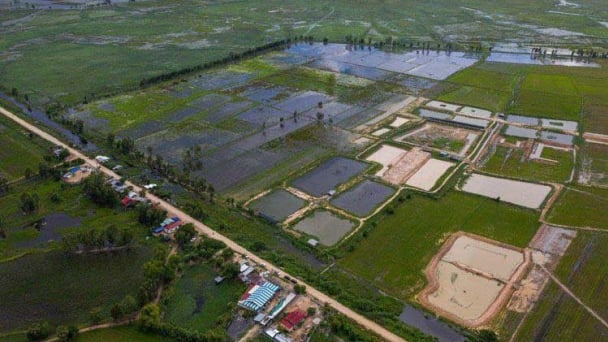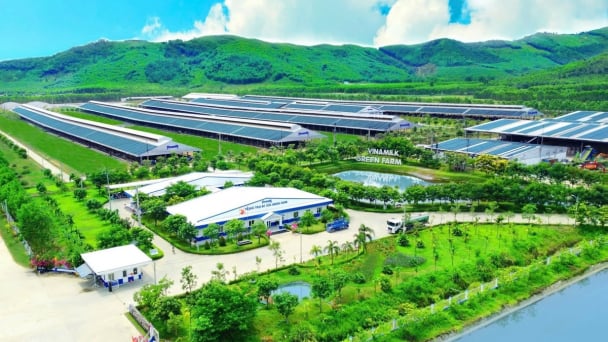May 14, 2025 | 08:40 GMT +7
May 14, 2025 | 08:40 GMT +7
Hotline: 0913.378.918
May 14, 2025 | 08:40 GMT +7
Hotline: 0913.378.918
The seminar “Promoting social factors in ESG” held on the morning of April 10 saw widespread agreement among many businesses that social factors in ESG (Environmental, Social, and Governance) standards should not be considered as mere additions or supplementary elements. Instead, they are a fundamental part of the sustainable development strategy. This is especially relevant in sectors closely connected to the community, such as agriculture and the environment.
Ms. Le Thi Hoai Thuong, Public Relations Director at Nestlé Vietnam, emphasized that social factors in ESG cannot be effectively implemented if they are simply imposed from the outside. For meaningful integration, they must start from within the organization itself. This means creating an internal environment that is fair, transparent, and free from discrimination. Moreover, she highlighted that promoting gender equality is a critical condition for ensuring a truly inclusive and equitable work environment.

Nestlé places special emphasis on social factors throughout its entire supply chain. Photo: Market Times.
Nestlé does not stop at internal organizational efforts but also proactively extends its social impact through programs that support the younger generation, such as “NestGen". This platform offers a combination of online learning and real-world experience, helping young people better adapt to an ever-evolving labor market. In addition to this, Nestlé is strongly committed to upholding high standards in its supply chain, including fair labor practices, environmental protection, and deforestation prevention. This commitment is reflected in Nestlé’s high ranking in the 2023 Forest 500 Index.
When it comes to social factors, the first aspect that Nestlé considers is the relationship between the company and its employees, as well as with the communities where it operates, its customers, and the entire ecosystem involved.
The Nestlé Group follows clear principles and regulations, supported by a robust monitoring and reporting system, to ensure that these commitments are properly implemented. As part of this approach, Nestlé prioritizes the creation of a healthy work environment, with a strong focus on promoting gender equality.
Nestlé has made clear and specific commitments and maintains a comprehensive monitoring system to ensure that its core values are consistently put into practice. With women making up 50% of the Board of Directors and holding more than 50% of senior management positions, Nestlé not only ensures internal fairness but also actively works towards creating a future generation of female leaders in fields such as engineering, where gender inequality has traditionally been more pronounced. By reaching out to female students while they are still in school and investing in skill development programs, Nestlé is fostering a confident, proactive, and capable future workforce of women who will go on to become leaders in their respective industries.
As a global leader in nutrition and food, Nestlé places a significant focus on social factors throughout its entire supply chain. In 2023, Nestlé achieved a high ranking in various assessments, including the prestigious Forest 500 Index, which acknowledges companies for their efforts to combat deforestation, prevent soil erosion, protect the environment, and promote fair labor practices within agriculture. This ranking not only reflects the company’s internal sustainability practices but also underscores the positive impact of its collaborations with external partners. These efforts demonstrate the company’s ongoing commitment to creating value not only for its business but also for the communities it impacts through responsible and sustainable practices.

Ms. Le Thi Hoai Thuong, Public Relations Director at Nestlé Vietnam (second from left), and Ms. Tran Thi Thu Trang, Chairwoman of Hanel PT (third from left), shared their insights at the seminar. Photo: Linh Linh.
Introducing the “Clean Vietnam” project by Hanel PT, an initiative focused on rehabilitating land in highland areas, where rural communities face challenges such as soil degradation, chemical contamination, and unsustainable farming practices, Ms. Tran Thi Thu Trang, Chairwoman of Hanel PT, explained: “Once the land is rehabilitated, farmers are no longer dependent on chemicals. They are able to cultivate crops independently, create their own sources of income, and, most importantly, gain the ability to better care for their families. This not only improves their livelihoods but also contributes to long-term sustainability".
"Social value does not lie in what we give to others or the actions we take, but in how we address social equality through the products and services that businesses provide", said Ms. Trang.
Translated by Phuong Linh

(VAN) Use of high-quality broodstock and biotechnology is regarded as the most effective approach to ensuring sustainable and economically viable shrimp aquaculture ahead of climate change and the emergence of increasingly intricate disease patterns.

(VAN) Carbon farming is a form of agricultural practices that helps absorb more greenhouse gases than it emits, through smart management of soil, crops, and livestock.

(VAN) This is a key content of the Memorandum of Understanding recently signed between the Vietnam Fisheries Society and Kunihiro Inc of Japan.

(VAN) To achieve the goal, local authorities and businesses in Kon Tum province have fully prepared the necessary conditions for the new Ngoc Linh ginseng planting season.

(VAN) Jiangsu province is gearing up to host training programs in Phnom Penh, the capital of Cambodia, this year to establish the Fish and Rice Corridor.

(VAN) Le Hoang Minh, representing Vinamilk, shared the company's experience in energy saving and green energy transition for production at a workshop held during the P4G Summit.